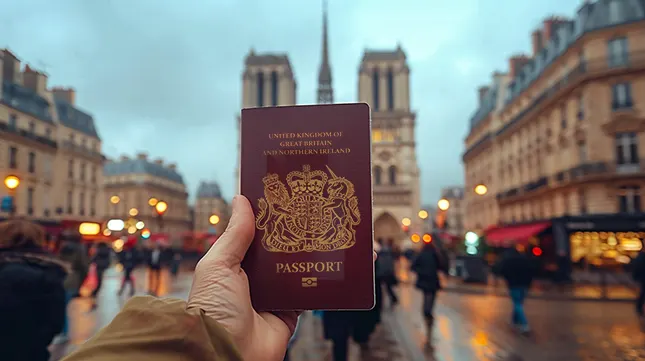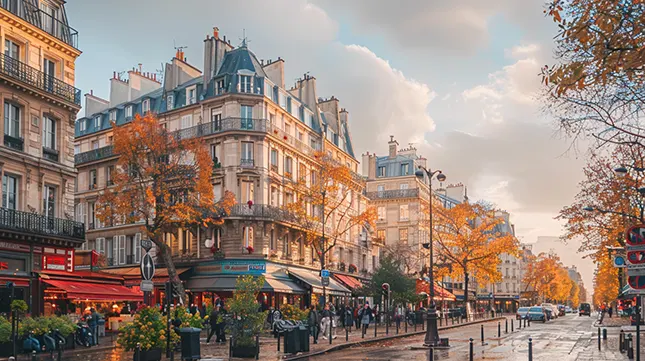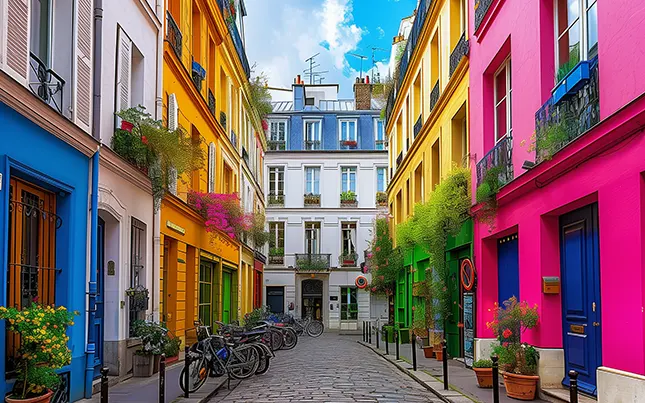Living in Paris – A Guide for Expats

Have you ever dreamed of calling Paris home?
The City of Love is certainly one of Europe’s most endearing destinations and there are plenty of reasons as to why.
For local Parisians, waking up to the scent of freshly baked croissants, strolling along the Seine, and indulging in world-class art and culture is almost a daily occurrence.
Paris offers an enchanting lifestyle filled with history, romance, and unparalleled joie de vivre!
It’s a city where every corner tells a story, from the charming cobblestone streets of Le Marais to the grandeur of the Champs-Élysées.
The vibrant neighbourhoods, each with its unique character, encourage exploration and promise the allure of living somewhere completely different from home.
Our guide to life in Paris aims to help you transition from merely a fleeting tourist to an experienced local by explaining the essentials of living in this magnificent city.
Embrace the History

Paris is home to numerous historical landmarks including Notre Dame Cathedral.
Paris is a city steeped in history, from its origins as a Roman settlement to its role as the heart of the French Revolution.
During the Middle Ages, Paris grew rapidly, becoming the capital of the Kingdom of France.
It emerged as a major political, economic, and cultural hub during this period when iconic landmarks such as the Notre Dame Cathedral and the Louvre Palace took shape.
Wander through the narrow streets of the Marais, visit the majestic Notre-Dame Cathedral, or explore the treasures of the Louvre to discover more about the incredible past that has formed Paris.
Each corner of Paris tells a story, making it a living museum that you’ll never tire of exploring.
Paris Has Many Nicknames
This city has garnered a number of nicknames over the centuries, each reflecting a different aspect of its charm and history.
The City of Light (La Ville Lumière)
This nickname gained prominence during the 18th century, the Age of Enlightenment, when Paris became a hub of intellectual and cultural activity. The name also refers to Paris’s early adoption of street lighting, making it one of the first cities in Europe to illuminate its streets.
The City of Love
Paris is synonymous with romance. Its scenic beauty, charming streets, and iconic landmarks like the Eiffel Tower create a perfect backdrop for love stories, making it a popular honeymoon destination and a symbol of romance in popular culture.
The City of Art (La Ville d’Art)
With world-class museums, Paris is celebrated for its rich artistic heritage. The city has been home to many renowned artists and continues to be a popular hub for contemporary art.
The City of Lights and Sounds
This nickname captures Paris’s vibrant nightlife and lively entertainment scene, from busy cafes and bistros to its many theatres, cabarets like the Moulin Rouge, and illuminated landmarks that light up the night.
Paname
A colloquial nickname used by locals, derived from the popularity of Panama hats in Paris in the early 20th century. It reflects a more casual, intimate familiarity with the city.

Moving to Paris will require you to obtain a visa, luckily there are plenty of avenues for entry.
Before you pack your bags, ensure you have the correct visa to live in France.
The French government offers various visa options tailored to different needs:
- Short-Stay Visa (Schengen Visa): This visa is ideal for stays up to 90 days, making it perfect for short-term work, business trips, or tourism.
- Long-Stay Visa: If you plan to stay more than 90 days, you’ll need a long-stay visa. This visa allows for various activities, including work, study, or joining family. It often serves as a residence permit.
- Work Visa: If you’re relocating for employment, ensure you have a job offer before applying. Your employer in France must obtain authorisation from the French Ministry of Labor. Once approved, you can apply for a visa with the required documents, including your work contract and proof of your qualifications.
- Student Visa: Students accepted by a French educational institution can apply for a long-stay visa. You’ll need proof of enrolment, financial resources, and health insurance. This visa also allows part-time work.
- Family Visa: If you’re joining a family member already living in France, you can apply for a family visa. This requires proof of your relationship, financial stability, and accommodation.
- Entrepreneur and Freelancer Visas: France encourages entrepreneurs and freelancers to apply for visas under the “Talent Passport” category. You must demonstrate your business plan, financial investment, and potential economic impact.
To begin your visa application process, visit the French government’s official visa page for comprehensive information, requirements, and application forms.
Start the process well in advance of your planned move, as obtaining the necessary documents and approvals can take time.
Additionally, consider consulting with a French consulate or a professional immigration advisor to ensure all your paperwork is in order.
Breaking the Language Barrier
While many Parisians speak English, learning French will enrich your experience.
Not only will it help you navigate daily life, but it will also endear you to locals.
When you live and work in Paris, you will surprise yourself at how quickly you pick up the language.
There are numerous online resources and language schools to help you get started, Duolingo and Babbel are great places to start.
Learning a new language is a challenge for sure. However, you will soon reap the benefits.
Embracing the Parisian Way of Life

Be sure to embrace the Parisian lifestyle when moving to the French capital.
Integrating into Parisian life involves more than just learning French.
Embrace the local customs and be open to adapting to cultural differences.
Parisians appreciate a slower pace of life, evident in their leisurely dining habits and social interactions.
They savour every moment, embodying the “joie de vivre” (joy of living) that defines their lifestyle.
A positive outlook and a balanced approach to work and leisure are hallmarks of the Parisian ethos.
Family time is highly valued, and the city’s social fabric is woven with moments of relaxation and enjoyment.
The warmer weather in Paris facilitates outdoor activities almost year-round, adding to the city’s charm.
While Parisians might initially seem reserved, this stems from a cultural emphasis on privacy. However, once you break through the initial barriers, you’ll find them to be warm, friendly, and welcoming.
Understanding and respecting these cultural nuances will help you integrate and make your Parisian adventure truly fulfilling.
Keeping the Cost of Living Down in Paris
Living in Paris can be pricey, but weighing the costs and exploring ways to make it affordable will help keep those costs down.
While Paris is known for its high living expenses, it’s often less expensive than London.
Essential expenses include accommodation, food shopping, dining out, and entertainment, but with some intelligent planning, you can manage your budget effectively.
Finding affordable housing and rentals can be challenging.
It is definitely worth considering living in outer arrondissements or neighbouring suburbs where property sells for less and rents are lower.
Save money by shopping at local outdoor markets where you can buy fresh bread, cheese, fruits, and vegetables at lower prices than supermarkets. Markets like Marché d’Aligre or Marché Bastille offer a variety of fresh produce and often sell meat and other essentials.
While dining out in Paris can be expensive, many independent cafes and bistros offer “specials” nights with discounted meals.
For affordable and delicious options, opt for the “plat du jour” (dish of the day) at local eateries.
Websites like La Fourchette provide discounts and special offers at various restaurants.
Take advantage of free or low-cost activities such as strolling along the Seine, visiting parks like Jardin du Luxembourg, or exploring the city’s many free museums and galleries.
Check out Paris.fr for information on free events and activities.
With some clever ideas such as these, enjoying Paris doesn’t always have to break the bank.
Choosing the Right Arrondissement (District)

There are 20 districts in Paris, each with their own character.
Understanding the area’s structure can help when considering where to live in the city.
Take your time and explore the different areas before deciding where you want to be.
Paris consists of 20 arrondissements, each with its own mayor and town hall.
They are numbered in a spiral pattern starting from the city centre and moving further out of the city.
Each arrondissement has a unique character, offering different residential, commercial, and cultural experiences, so you have plenty of choices to find the dream spot for your Parisian adventure.
You can familiarise yourself with the districts and where they are located by visiting the ParisMap360 website.
Cost of Renting a Home in Paris

Renting is a great way to explore various different areas of Paris without fully committing and buying a property.
Finding a place to live is a top priority and likely your biggest expense when moving to Paris.
Much like any major city, prices will vary significantly depending on the neighbourhood, with central areas being more expensive than the outskirts.
For example, a one-bedroom apartment in central Paris costs around £1,141 per month, in contrast, suburban areas offer lower rents, averaging about £840 per month.
Keep in mind that this often comes with trade-offs, especially when it comes to city conveniences and amenities. (All rental stats taken from Numbeo)
Living further from the centre might mean longer commutes and fewer local attractions, but it can also offer a more spacious living environment and far lower rental costs, so be sure to evaluate your priorities and pick a spot accordingly.
Buying a Home in Paris
The good news for those of you thinking of purchasing a property is that it is a buyers’ market in Paris.
For more information about how the property markets are performing in Paris, take a look at the Paris Property Group’s recent report.
Purchasing a home in Paris differs from the UK and will certainly seem complicated at first!
However, with proper planning, research, and assistance from experienced professionals, British expats can successfully navigate the process.
Here is a simple step-by-step guide to the process of purchasing a property in Paris.
Research and Budgeting
- Familiarise yourself with the French property market.
- Set a realistic budget.
- Notaires de France offers market trends and pricing information.
Finding a Suitable Property
- Use real estate websites like Seloger and PAP to search for the ideal property
- Consider hiring a local real estate agent for expert guidance.
Engaging a Notaire
- Essential for drafting and executing contracts, legal compliance, title searches, and ownership transfer.
- More about their role on Notaires de France.
Making an Offer
- Offers are typically made through your real estate agent.
- If accepted, sign a preliminary contract (compromis de vente) binding for both parties.
Due Diligence
Your Notaire will conduct due diligence, verify the title, and check for any outstanding debts or legal issues against the property.
Finalising the Purchase
- Sign the final sale (acte de vente) in the presence of the Notaire.
- Pay the balance and complete the ownership transfer.
Costs to Consider
- Notaire fees are around 7-8% of the property price, and registration fees and taxes must also be paid.
- Understanding these costs is crucial to avoid any unpleasant financial surprises.
How Much Will It Cost to Buy a Home in Paris
Despite Brexit altering the rights of UK citizens to live and work in France, purchasing property remains possible.
While 100% mortgages are limited to French tax residents, EU nationals, including British citizens, can access loan-to-value mortgages of up to 80-85%.
For non-EU citizens, the limit is typically up to 60%.
Property prices vary wildly, depending on the district and size.
Inevitably, homes closer to the centre of the city always attract higher prices.
In the most prestigious areas, such as the 1st and 7th arrondissements, luxury properties can be priced at up to £29,700 per square metre.
According to Rightmove, a one-bedroom studio flat can be bought for around £100,000.
However, these are rare finds, with apartments generally selling for closer to the £300,00 mark.
Like London, finding a reasonably priced home in central Paris is no small task but keep in mind that not all arrondissements are created equal, and you can find cheaper areas with a bit of knowledge and some good house hunting skills.
The 20th arrondissement has the most affordable properties in Belleville, Menilmontant, Saint-Fargeau, Père-Lachaise, and Charonne. In these locations, you can expect to pay around £11.28 per square metre.
Realtin has published an excellent report about each arrondissement in Paris and what you will likely have to send in each area for a home.
Job Hunting in Paris

Paris is a city full of opportunities when it comes to employment.
You must first ensure that you have a work permit before you can get a job in Paris.
Ideally, you need to have at least some knowledge of the French language as fluency significantly enhances employment prospects.
Securing a job in Paris can be streamlined by leveraging a few key strategies and focusing on thriving industries.
Utilising job search websites like LinkedIn, Justlanded, and Glassdoor can provide access to numerous opportunities across various sectors.
Networking is also vital if you are considering moving abroad; attending industry events and joining professional groups on platforms like Meetup can facilitate valuable connections.
Some of the top industries in Paris include technology, finance, fashion, hospitality, and education – with such a diverse range of industries there really is something for everyone in the French capital.
The technology sector is particularly vibrant, with numerous startups and established companies seeking skilled professionals in software development, data science, and digital marketing.
The finance sector, centred around La Défense, offers banking, insurance, and investment roles.
Paris’s reputation as a fashion capital opens design, retail, and marketing opportunities within leading fashion houses and boutiques.
The hospitality industry, including hotels, restaurants, and tourism services, is another significant employer, especially for those with multilingual skills.
Finally, the education sector provides roles for teachers, particularly English language instructors, at international schools and language institutes.
To enhance your chances, consider enrolling in local language courses and seeking internships or volunteer positions to gain experience and demonstrate commitment to potential employers.
Parisian Work Culture
Those of you thinking of making the move to Paris will also need to consider the major differences in culture in the workplace and whilst not something that may seem important at first, it will undoubtedly have a huge impact on your time here!
French work culture emphasises professionalism and respect.
Punctuality is key, and formal greetings are the norm, with a handshake or “bonjour” being customary.
Office attire tends to be more formal, reflecting the importance placed on appearance and presentation.
The workday can be intense, with a strong focus on productivity and efficiency.
However, the French also value a clear separation between work and personal life.
Long lunch breaks, often lasting up to two hours, are common and provide an excellent opportunity for relaxation and socialising, ideal if you are still getting to know your coworkers.
This tradition underscores the French appreciation for food and communal dining, often seen as an important part of daily life.
French employees are entitled to at least five weeks of paid holiday annually, making it among the highest in the world.
With ample time off, workers can recharge and enjoy leisure activities, contributing to high job satisfaction and mental well-being.
Moreover, French labour laws protect employees with strong working hours and conditions regulations.
The standard workweek is capped at 35 hours, though overtime is possible and regulated.
In summary, while Parisian work culture demands professionalism and dedication, it also recognises the importance of balancing work with personal life.
This dual focus on productivity and well-being creates a unique and sustainable work environment that values both efficiency and quality of life.
Exploring Paris

There are countless attractions to visit in Paris, including the Arc de Triomphe.
Living in Paris gives you access to a wealth of attractions and when you first move here it will feel like there’s always something new to discover!
From iconic landmarks like the Eiffel Tower and the Louvre to hidden gems like the Musée Rodin and the Canal Saint-Martin, there’s never a dull moment.
Take advantage of the city’s excellent public transport system to explore every corner of Paris, you certainly won’t regret it.
Here is a list of the top 10 attractions in Paris:
- Eiffel Tower
- Louvre Museum
- Notre-Dame Cathedral
- The Avenue Champs-Élysées
- Arc de Triomphe
- Sacré-Cœur Basilica
- Palace of Versailles
- Musée d’Orsay
- Luxembourg Gardens
- Sainte-Chapelle
Paris is known for its walkability, with many major attractions located within close proximity.
The city’s layout encourages walking, with picturesque streets, historic landmarks, and numerous parks and gardens.
The Paris Métro, much like the London Underground, is one of the fastest and most efficient ways to travel around the city.
With 16 lines and over 300 stations, the Métro covers virtually all parts of Paris, with trains running frequently, making it an extremely reliable mode of transportation for locals to utilise.
The RER (Réseau Express Régional) trains connect central Paris with suburban areas and major airports like Charles de Gaulle and Orly for longer distances.
Paris also has an extensive bus network, which complements the Métro system.
Buses are also particularly useful, especially when you are trying to reach any of the areas not served by the Métro or for enjoying a scenic route through the city.
They operate frequently throughout the day and cover a wide range of destinations, meaning there are multiple modes of transport for Parisians to choose from.
Overall, navigating Paris is straightforward and enjoyable, whether walking or using the comprehensive public transportation system.
Escaping Beyond Paris
While Paris offers an abundance of attractions such as galleries, museums, and shopping centres, the real charm lies in its accessibility to a multitude of captivating destinations just outside the city.
Within a few hours, one can easily transition from the hustle and bustle of Parisian life to the serene vineyards of Champagne or the majestic châteaux of the Loire Valley.
Hop on the RER and explore the enchanting villages and countryside surrounding the city.
For those craving a bit more adventure, the French Alps are just a short journey away, offering world-class skiing and breathtaking mountain scenery.
Additionally, the Eurostar provides a swift and affordable route back home to London.
So many wonderful places are at your fingertips when you live in Paris.
Making the Move to Paris

White & Company Truck
Moving to Paris is an exciting adventure. With careful planning and an open mind, you’ll soon feel at home in this extraordinary city.
To kickstart your relocation to Paris, it’s essential to engage a reliable removal firm that specialises in European moves.
For top-notch services, consider White & Company, a leader in the industry known for its dependable and competitively priced European removals.
Supported by memberships in prestigious organisations such as BAR (British Association of Removers), Omni, and FIDI, White & Company can assure you of high standards and quality assurance.
Contacting White & Company is straightforward and convenient!
You can request a free, no-obligation home or virtual survey to get an accurate quote tailored to your specific needs.
Additionally, they offer an online quick quote form and a helpful chatbot to help you effortlessly schedule your move.
Don’t hesitate—contact White & Company today and take the first step toward your Parisian journey.

Max is a seasoned writer and blogger in the real estate and home moving sectors, as well as a knowledgeable source of information for expatriates living and working abroad. His detailed insights have helped thousands of people move and live abroad with greater simplicity and ease.
Posted in: News
Leave a Comment (0) ↓


